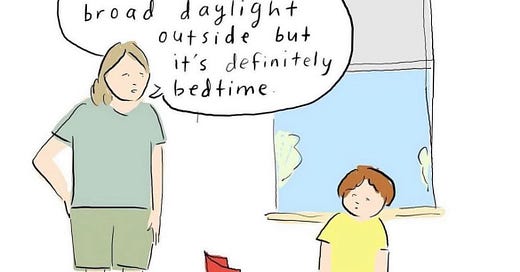Read
Yearning to be a father, but still waiting (New York Times)
‘I didn’t even know men could get it’: the hidden impact of male postnatal depression (The Guardian)
Since Father’s Day was earlier this month, I wanted to start with two articles about dads.
The first article discusses the psychological toll of infertility on men. When my husband and I were struggling with secondary infertility, I turned to girlfriends who had gone through IVF and various online support forums. My husband basically just had me to rely on for emotional support. This article features five different dads talking about their experiences of isolation and grief.
The second article highlights the prevalence of postpartum mood disorders among men. Though there has been increasing awareness and de-stigmatization around postpartum depression in women over the past decade, recognition and resources for the 10% of new fathers who experience postpartum depression are significantly more limited.
Both articles subtly highlight the toll that rigid gender norms have on men, making it feel taboo for them to ask for support. Something to keep in mind for those of us raising boys.
One state just became a national leader on child care. Here’s how they did it. (Vox)
Let’s hear it for Vermont! The Vermont Senate recently approved a bill authorizing a $125 million annual investment in the state’s childcare system (the Democratic super-majority overrode the governor’s veto on June 20). The new initiative, funded, in part, by a new payroll tax will do the following:
Expand the eligibility cap for childcare assistance to families making 575% of the federal poverty level.
Expand the number of families receiving free childcare to those making 175% of the federal poverty level.
Set a minimum pay standard for early childcare workers.
Create a loan repayment program for new graduates who commit to working in VT’s childcare system.
How summer camp became such a hot mess for parents (Bloomberg)
I like to joke that I loved summer until I became a mom. Why? Because hodge-podging together childcare is the bane of my existence. At least this year my kids are old enough to go to the same camps, but in previous years it’s meant two separate drop-off/pick-up locations and times, and a dearth of full-day options for the younger one. The whole endeavor is, indeed, a hot mess.
Not that you need the reminder, but I’ll say it anyways: It doesn’t have to be like this! In the meantime, here are some potential camp-related tax credits for you to be aware of.
How to support parents of neurodivergent children at work (HBR)
This article was authored by two parents of neurodivergent kids and encourages employers to both appreciate the unique experiences and perspectives these parents bring to the workplace, and provides tangible ways that employers can better support this demographic. Much of their advice is transferable to parents of medically complex or disabled children, as well—particularly the recommendation for flexibility, as well as “systems and processes to help employees more easily integrate their work and parenting challenges”.
Connect
One of my favorite professional development ideas is creating a personal board of advisors—in other words, assembling a diverse group of people who can serve as a sounding board or source of advice. According to a recent HBR article (meant for new grads, but still full of good advice):
A career board of directors [. . .] is a more expansive network of individuals who act as independent advisers to you. Just as a company looks to its board for guidance, these people are there to offer you support in a broader sense. Each director usually specializes in a different area: a great manager, a skilled writer, a savvy freelancer, a wise parent, a compassionate friend, a talented peer, and so on. As such, each is able to offer you advice specific to their expertise.
The goal is to put together a group of people with experiences completely distinct from your own who can offer you a fresh perspective when needed. You can reach out to them with smaller asks than you would a mentor — though, over time, a few of them may grow into that role.
When you think about establishing your own board of directors, consider the areas in which you need the most guidance. In addition to concrete skills, it would likely make sense to include an older working mom who can serve as a sounding board on that front.
Reflect
I’ve always been a pretty motivated and self-disciplined person, but when I transitioned to working primarily for myself, I wanted to make sure I had systems in place to support my success. One of those systems has been establishing a monthly “accountability group” with other women entrepreneurs/freelancers. We discuss both big-picture questions (“What energizes you?”) and push each other to stay on task (“Ok, so what steps are you going to take this month to move this project along?”) It’s been tremendously helpful—and fun!
With that in mind, I invite you to reflect:
What does accountability mean to you?
Who helps keep you accountable?
How can you become more accountable moving forward?






My husband and I just made the decision that this will be our last summer with the daycare provider we've had since our eldest child was 3mo... which means we'll be cobbling it together next summer for the first time ever... and I'd be lying if I said I am not genuinely afraid. Neither of my kids are interested in camp (I'm not sure my 9yo could actually handle camp) so I'm 99% sure we'll just end up hiring a nanny -- which is fine, which is great -- but I'm already stressing about that (a year in advance) 😳😭